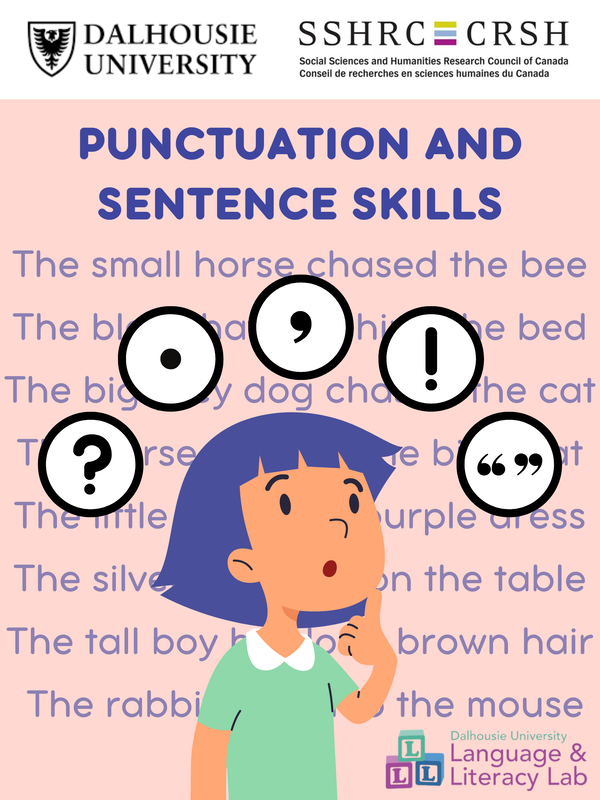Punctuation and Sentence Skills
|
WHAT IS THE STUDY ABOUT?
Reading is one of the most important skills that children learn. We are working with a wide range of learners to understand what children of different ages know about two aspects of text: punctuation marks and the organization of sentences. As children progress through elementary and middle school, they encounter increasingly complex reading materials. Our findings will increase our understanding of what children know about these aspects of text and will inform how we can best support this understanding to improve literacy lessons and interventions. |
PROJECT HISTORY
|
From January to March 2022, we worked with 127 children across the elementary and middle school years (Grade 2 to 9). Children met with researchers virtually and completed several activities. To assess their reading level, children read lists of real and made-up words. To assess what they know about sentence organization, children were asked to listen to (or read) sentences of increasing complexity and then choose the picture that goes with what they heard (or read). The complexity of the sentences was manipulated by increasing the number of clauses (e.g., One clause - “The girl was eating”; Four clauses - “John’s mom drove the car that was yellow to the store while John followed her on his bicycle that was red”). To assess what they know about punctuation marks, children were asked to add punctuation marks to sentences and answer questions about what punctuation marks do.
|
In July 2022, we also worked with 33 adults who completed the same reading and punctuation activities. Data from adults allows us to appreciate when children’s performance becomes adult-like.
WHAT'S NEW?
In the future, we plan to work with students in Primary and Grade 1 to examine very early knowledge about punctuation marks and the organization of sentences.
In the future, we plan to work with students in Primary and Grade 1 to examine very early knowledge about punctuation marks and the organization of sentences.
WHAT HAVE WE FOUND SO FAR?
Sentence Organization
We examined how well children in Grades 2 to 9 understood the meaning of increasingly challenging sentences. Children appeared to accurately grasp how sentences work in speech and text, regardless of grade and sentence complexity. This suggests that even young school-aged children have fundamental knowledge of essential sentence-level skills.
We examined how well children in Grades 2 to 9 understood the meaning of increasingly challenging sentences. Children appeared to accurately grasp how sentences work in speech and text, regardless of grade and sentence complexity. This suggests that even young school-aged children have fundamental knowledge of essential sentence-level skills.
Punctuation Marks
We examined what children and adults know about and how they use various punctuation marks. We compared performance across five age groups: Grades 2 and 3, Grades 4 and 5, Grades 6 and 7, Grades 8 and 9, and adults. Overall, we found that performance on our knowledge and use of punctuation activities increased across all grades and into adulthood, with significant increases between Grades 2/3 and Grades 6/7. This appears to be a key time period for learning about punctuation marks.
When looking at individual punctuation marks, we found an interesting developmental pattern. Children already use periods and question marks quite accurately in Grades 2/3. Quotation marks are mastered next, with children’s knowledge and use increasing significantly between Grades 2/3 and Grades 4/5. Commas are the latest learned punctuation mark of those we examined, with significant increases in knowledge between Grades 4/5 and Grades 8/9, and use between Grades 4/5 to Grades 6/7. These results show the long process of learning about this special part of writing.
We examined what children and adults know about and how they use various punctuation marks. We compared performance across five age groups: Grades 2 and 3, Grades 4 and 5, Grades 6 and 7, Grades 8 and 9, and adults. Overall, we found that performance on our knowledge and use of punctuation activities increased across all grades and into adulthood, with significant increases between Grades 2/3 and Grades 6/7. This appears to be a key time period for learning about punctuation marks.
When looking at individual punctuation marks, we found an interesting developmental pattern. Children already use periods and question marks quite accurately in Grades 2/3. Quotation marks are mastered next, with children’s knowledge and use increasing significantly between Grades 2/3 and Grades 4/5. Commas are the latest learned punctuation mark of those we examined, with significant increases in knowledge between Grades 4/5 and Grades 8/9, and use between Grades 4/5 to Grades 6/7. These results show the long process of learning about this special part of writing.
QUESTIONS ABOUT THE STUDY
If you have any questions about our study, please contact Language and Literacy Lab manager Stef Hartlin at [email protected].
If you have any questions about our study, please contact Language and Literacy Lab manager Stef Hartlin at [email protected].
MEET THE RESEARCH TEAM
The Punctuation and Sentence Skills study is led by Dr. Hélène Deacon (LLL Director), Alex Ryken and Mariam Elgendi (PhD Students), and is supported by Lab Manager Stef Hartlin and undergraduates Elise Lynch, Daneesha Williams, Marilla Hulls, and Jolena Klymyshyn.
The Punctuation and Sentence Skills study is led by Dr. Hélène Deacon (LLL Director), Alex Ryken and Mariam Elgendi (PhD Students), and is supported by Lab Manager Stef Hartlin and undergraduates Elise Lynch, Daneesha Williams, Marilla Hulls, and Jolena Klymyshyn.
|
Stef Hartlin
Project Manager |
|
Daneesha Williams
Undergraduate Student |
Jolena Klymyshyn
Undergraduate Student |
THANK YOU TO OUR PARTNERS AND FUNDERS
Thank you to all of the families for taking part and to our funders. Our work would not be possible without your support!
Thank you to all of the families for taking part and to our funders. Our work would not be possible without your support!











